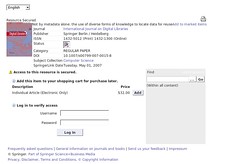 Looking at the critics about Open Access Critics of the various open access initiatives point out that there is little evidence that a significant amount of scientific literature is currently unavailable to those who would benefit from it. From Wikipedia/Open_access.
Looking at the critics about Open Access Critics of the various open access initiatives point out that there is little evidence that a significant amount of scientific literature is currently unavailable to those who would benefit from it. From Wikipedia/Open_access.
Looking for a specific article about meta data and archiving, I found one available via the restricted access of Springer for an impressive price. One of the major argument of publisher is to say that the access to some publication is only useful to a small amount of reader having the ability to pay for the article by them self or by their institution. Sorry but I would benefit from this article but $32 for a single article. The only benefit is for the publisher. Some years, the publishers were claiming that the electronic publication will lower the prices compared to printing… That's the opposite they limited the access to a very small subset of potential readers and increase the cost per article. Why ? Simply due to the global access given to the publishers to reach the "rich" readers only (with standard printing there were forced to reach a minimal number of users to cover their cost of printing/publication). Neither such practices it's an advantage for the author or the reader. An author without reader (or with a limited set) is not really useful especially in the scientific world. I'm still wondering why such publication about digital libraries are still published in that way and not using open access… Open access has the major advantage to give the access to a large set of potential readers and by so improving the interactivity between researchers/readers/authors.
Tags: reader publisher openaccess education innovation research

